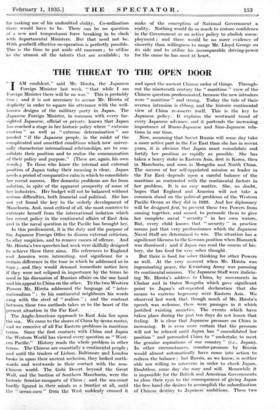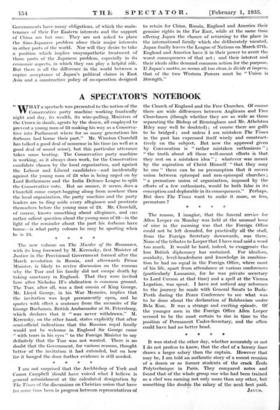THE THREAT TO THE OPEN DOOR
"y AM confident," said Mr. Hirota, the Japanese I Foreign Minister last week, " that while I am Foreign Minister there will be no war." This is probably true ; and it is not necessary to accuse Mr. Hirota of duplicity in order to square his utterance with the welt- knoim designs" of the military party in Japan. The Japanese Foreign Minister, in common with every far- sighted Japanese, official or private, knows that Japan has reached a stage in her historic policy where " extreme caution " as well as " extreme determination " are needed " if the JaPanese people, in the midst of the complicated and unsettled Conditions which now univer- sally characterize. international relationships, are to con- solidate their position and to realize the consummation of their policy and purpose." (These are, again, his own words.) TO those who know the internal and external position of Japan today their meaning is clear. Japan needs a period of comparative calm in which to consolidate her recent success. Her. domestic problems are far from solution, in Spite of the apparent prosperity of some of her industries. Her budget will not be balanced without serious difficulties, both financial and political. She has not yet found. the key to the orderly development of Manchuria. And, most critical of all, she must contrive to extricate herself from the international isolation .which her recent policy in the continental affairs of East Asia and in the naval question in the Pacific has brought her. In this predicament, it is the duty and the purpose of the Japanese Foreign Office to disarm external criticism, to allay. suspicion, and to remove causes of offence. And Mr. Hirota's two speeches last week were Skilfully designed to achieve these three aims. His reference's to England and America were interesting, and significant for a certain difference in the tone in which he addressed us in turn ..and they would demand immediate notice, here if they were not eclipsed in importance by the terms he used:in- his discussion of Russian affairs on the one hand and his appeal to China on the other. . To the two Western. Powers Mr. Hirota addressed the language" of " inter- nationalism . to his continental neighbOurs his words rang with the steel of " realism " ; and the contrast between, these two methods takes us to the heart of the present situation in the Far East.
The Anglo-American approach to East Asia lies upon the sea, We came to the shores of China by cr.- ean routed, and we conceive of all Far Eastern problems-in ma. ritime terms.. Since the first contacts with China and JaPan the Western World has viewed every question as " West- ern Pacific." . History reads the whole problem in other terms. The Chinese are essentially a continental people ; and until the traders of Lisbon, Baltimore and. London broke in upon their ancient seclusion,,they looked north- wards and westwards . in their contact with the . non- Chinese world. The Gobi Desert beyond the Great Wall, and the bastion of Southern Manchuria, were the historic.frontier-ramparts of China _; and the, sea-coast hardly figured in. their minds, as a frontier at all,_ until the -" ocean-men " from the West suddenly crossed it and upset the ancient Chinese order of things. Through- out the nineteenth century the " maritime " view of the Chinese question predominated, because the new intruders were " maritime- " and strong. Today the tide of their oversea intrusion is -ebbing, and the historic continental. view of China re-asserts itself. This is the key to Japanese policy. It explains the westward trend Of every Japanese advance, and it portends the increasing importance of Russo-Japanese and Sino-Japanese rela- tions in our time.
Now, assuming that Soviet Russia will some day take a more active part in the Far East than she has in recent years, it is obvious that Japan must consolidate and fortify her position as rapidly as possible. She has taken a heavy stake in Eastern Asia, first in Korea, then in Manchuria, and soon in Mongolia and North China. The success of her self-appointed mission as leader in the Far East depends upon a careful balance of the maritime as contrasted with the continental factors in her problem. It is no easy matter. She, no doubt, 'hopes that England and America will not take a common' stand on the political problems of the Western Pacific Ocean as they did in 1922. And her diplomacy will be designed first, to prevent these two Powers from coming together, and second, to persuade them to give her complete naval " security " in her own waters. But,- every child knows that " security " in practice means just that very predominance which the Japanese Naval Staff are determined to win. The situation has a significant likeness to the German position when Bismarck was dismissed ; - and if Japan can read the omens of his- tory, she has food for very sober thought.
-But there is food for sober thinking for other Powers as well. At the very moment when Mr. Hirota was ingeminating peace, the Kwantung Army was pursuing its continental mission. The Japanese Staff were italiciz- ing Mr. Hirota'S address to China, by movements in Chahar and in Outer Mongolia which gave significant point to Japan's oft-repeated declaration that she means to exercise hegemony over Eastern Asia. We observed last week that, though much of Mr. Hirota's speech was welcome, there were passages in it which justified existing anxieties. The events which have taken place during the past ten days do not lessen that feeling. It is clear that Japanese pressure on China is increasing. It is even more certain that the pressure will not be relaxed until Japan has " consolidated her position " and persuaded China to " undertake to meet the -genuine aspirations of our country " (i.e., Japan). In other circumstances, counter-pressure by Russia would almost automatically have come into action to redress the balance ; but Russia, as we know, is neither able nor willing to intervene in order to check Japan. Doubtless; some day she may and will. Meanwhile it is impossible. for the British and American Governments to close :their eyes to the consequencei of giving Japan the freehand she desires to accomplish the subordination of Chinese destiny to Japaneie ambitionS. These two Governments have many obligations, of which the main- tenance of their Far Eastern interests and the support of China are but one. They are not asked to place the Sino-Japanese problem above their major interests in other parts of the world. Nor will they desire to take a position which implies unsympathetic treatment of those parts of the Japanese problem, especially in its economic aspects, in which they can play a helpful role. But there is all the difference in the world between a supine acceptance of Japan's political claims in East Asia and a constructive policy of co-operation designed to retain for China, Russia, England and America their genuine rights in the Far East, while at the same time offering Japan the chance of returning to the place in the international family which she deliberately vacated. Japan finally leaves the League of Nations on March 27th. England and America have it in their power to avert the worst consequences of that act ; and their interest and their ideals alike demand common action for the purpose. If Japan's motto, as seems all too clear, is divide et impera, that of the two Western Powers must be "Union is Strength."















































 Previous page
Previous page